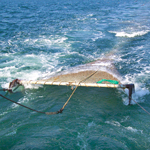RETROCAN
 |
Trophic web and coastal ecosystem under anthropic pressure |
|
Research
Context and Issues
The main objective of Retrocan is to understand terrestrial vs offshore influences on marine coastal ecosystem functioning. It is focused on the northern part of the Bay of Biscay and based on a two-scale transect approach using trophic markers (C and N isotopes and fatty acids) measured at various levels of the benthic food web. The first scale concerns the bays (3-40 m deep) sheltered by islands and shoals. The second scale concerns gradients from inshore to the continental margin (3-170 m deep).Results
- Isotopic spatio-temporal trends from primary producers to secondary consumers give evidence of a clear contrast in the functioning of the Bay of Brest compared to the Bay of Vilaine, where freshwater inputs are much larger.
- Isotopic N of benthic consumers (invertebrates and fish) shows a general decreasing trend across the continental shelf. Questions arise about N isotopic fractionation and food sources at greater depths, where, according to fatty acid analysis, the latter are more characterised by detrital material.
Publications issued from the project
MORTILLARO, J.-M. SCHAAL, G. GRALL, J. NEROT, C. BRIND'AMOUR, A. MARCHAIS, V. PERDRIAU, M. LE BRIS, H. (2014) .Comparative study of isotopic trends in two coastal ecosystems of North Biscay: a multitrophic spatial gradient approach
NEROT, C. (2011) .Invertebres benthiques et biomarqueurs: temoins du fonctionnement trophique des ecosystemes cotiers
People involved
 |
LE BERRE Thomas, Technician Phone : +33 2 23 48 59 23 Email : thomas.leberre@institut-agro.fr |
 |
LE BRIS Hervé, Scientist Phone : +33 2 23 48 59 28 Email : herve.le-bris@institut-agro.fr |
Partners
Institut Universitaire Européen de la Mer, Université de Bretagne Occidentale (UBO), Jacques Grall
UMR UBO-CNRS-IRD-IFREMER, LEMAR, Brest : Caroline Nérot, Gauthier Schall, Fabrice Pernet
Funding and Support
IFREMER (Oceanographic Vessel Gwen Drez)
CNRS-Insu and Ifremer (support Ecosphère Continentale et Côtière “Retrocan”)
Council of Bretagne (grant Stratégie d’Attractivité Durable “Recomab”)
Université Européenne de Bretagne (grant Equipes Projets Transversaux “Moresca”)
